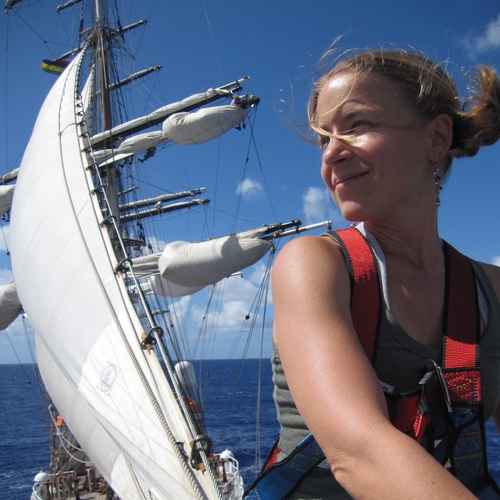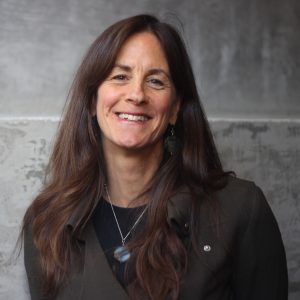As a lead up to Sustainable Brands conference SB’18 , students, alumni, and faculty of our MA in Sustainable Design program interviewed selected speakers — leaders in corporate sustainability initiatives. In this blog we share our interview with Anna Cummins, Co-Founder and Global Strategy Director of The 5 Gyres Institute.
Anna Cummins received her undergraduate degree in History from Stanford University, and her Masters in International Environmental Policy from the Middlebury Institute for International Studies. Anna spent much of her early youth playing in Santa Monica storm drains and exploring beaches, experiences that sparked her interest in the land-sea connection. Anna has spent the last 25 years working in the environmental field, in marine conservation, bilingual outreach, and sustainability education. She and her husband founded 5 Gyres in 2009, to stop the flow of plastic pollution from source to sea through science, education, and adventure.
What did you talk about at SB’18?
There were a number of us in the panel, exploring different aspects of the plastics issue. Since 5 Gyres has first hand experience with the downstream impacts of plastic pollution, I gave some global context on the science, as well as a new narrative emerging around the health costs of plastics across the entire supply chain.
As a movement, we are looking more comprehensively at the impacts of plastic as a fossil fuel product – from extraction, to production, to distribution to recovery and/or contamination. In addition to plastics in the oceans, there are climate implications of extracting and burning fossil fuels, as well as serious health and justice implications, particularly for marginalized communities that live near oil wells. With our partners at the Break Free from Plastic movement, we’ve been paying close attention to the Fueling Plastics series from the Center for International Environmental Law, sharing reports on the the Industry’s plans to significantly scale plastic production in next 10 years, building 263 new extraction facilities in the US. Global demand for plastic is largely fueling this increase.
Our other panelists explored producer responsibility, microfibers engagement with the textile industry, and other solutions to the plastics issue.
What is the most exciting thing you’re working on?
One project we’re excited about is a partnership with the Mother Earth Foundation (MEF) and GAIA (who were also represented in the panel). We received a grant from the State Department to support GAIA’s work in Southeast Asia, engaging entire communities in zero waste efforts. While some voices advocate for expensive and often polluting waste-to-energy technology, GAIA and their partners are able to achieve real, metric results on waste diversion for a fraction of the cost. After communities have sorted, recycled, composted, and gathered data on the residuals, i.e. what’s left over, we’re plugging that information into the BAN (Better Alternatives Now) List. Importing and analyzing these data helps illustrate where to focus on redesign, as well as which brands may bear greater responsibility.
The more data we have on brand accountability, the better conversations we can have about comprehensive solutions. We need everyone on board – policymakers, communities, brands, and designers.
On a more local level, BAN List 2.0 showed that polystyrene was a common offender, so we’re collaborating with a number of NGO partners on eliminating polystyrene (#6 plastics) with our Nix the Six campaign.
We’re also doing our first expedition in SE Asia, from Bali to Komodo Island, engaging local scientists in ocean sampling for microplastics, and gathering baseline information.
What was your personal path to sustainability?
The first moment I really became aware of sustainability was when I was 14 and decided to become a vegetarian. I started reading all kinds of books on the subject, including Diet for a New America by John Robbins, that explains the footprint of meat consumption. It was my first inkling that our daily choices have real impacts. Fast forward to my early 20s when I was living in Spain, I saw a documentary on Ecological Design, and it struck me that it makes so much sense to design spaces that work in synergy with nature, rather than against nature.
When I went back to the States, I started teaching workshops in ecology to 9th graders. I realized that I has a lot of negative feelings about what was going on, and I was conveying that in my teaching. I remember when one kid said, “You mean even barbecues are bad?”
I realized then that I needed to inspire from a place of positivity rather than from fear.
If you could travel back in time what would you tell your 20-year-old self?
First, I would share the lesson that the 9th grader taught me. Coming at people with scare tactics or doom and gloom doesn’t generally inspire or engage. Now that I’m in my 40s, and I see/feel how busy and stressed people are, I really get that more fear or guilt doesn’t do service to the movement.
I would tell my 20-year-old self to lighten up and find the fun in this work.
What has been your proudest moment in sustainability?
The national ban on microbeads in 2015. This was the result of a 2-year campaign involving dozens of organizations. We first realized that microbeads were a problem when we went into the Great Lakes in partnership with Dr. Sam Mason from SUNY Fredonia. We wanted to engage people who didn’t live right on the ocean. We discovered microbeads in Lake Erie and published the results, which became the backbone of broader collaboration, with many different groups in California and beyond. The victory here, when President Obama signed a National bill, reminded me that small organizations working together can drive big changes. But mcirobeads are one, small source of the problem – we have a long way to go yet.
In a more broad sense, the world is now paying attention to plastic issues. In 2009, when we started, very few people were as paying attention. Now the issue is scaling – the fact that over 1000 NGOs are involved with Break Free from Plastic is a case in point. I’m also proud that we’ve been a part of this growth.
If you had a magic wand and could completely solve one sustainability problem, what would it be?
Climate change. Plastic is indeed a part of a climate change, as I mentioned earlier. The tricky thing about this question is that all of these sustainability issues are intertwined.
Perhaps more importantly, I would change our political system, i.e. campaign finance reform, and the growth-at-all-costs mentality that landed us here in the first place. I would create a regenerative model, including how we treat each other.
Thank you, Anna!
~Denise
[image courtesy of 5 Gyres]
If you want to become a leader in sustainability, consider joining our MA in Sustainable Design program!


